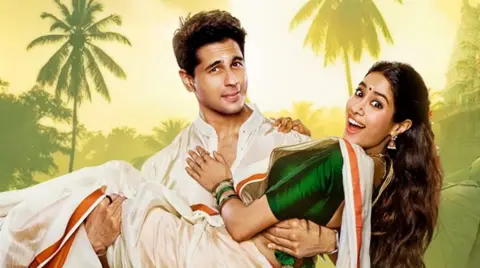A new Bollywood film has reignited an age-old conversation around how India's largest and most influential film industry represents characters from non-Hindi speaking states.
'Param Sundari', a romcom starring Sidharth Malhotra and Janhvi Kapoor, is a love story between a woman from the southern state of Kerala and a man from Delhi in northern India. Param and Sundari first butt heads and then fall in love, successfully overcoming the cultural differences between them.
The idea isn't new: Bollywood has long explored north-south cultural clashes through romcoms, and in a multilingual country, well-executed cross-cultural romances can be a hit. But in this case, critics and social media users from Kerala and beyond have called out the film for its caricatured depiction of the state, particularly Sundari.
Played by Kapoor, Sundari often wears a string of jasmine flowers in her hair, can communicate with elephants and climbs coconut trees as a hobby - all stereotypical traits often associated with Kerala. Though she's lived there most of her life, her Malayalam is atrocious.
The criticism began as soon as the film's trailer was shared, with many puzzling over Sundari seemingly mispronouncing her own name. This also invited comparison with another much-derided character, Shalini Unnikrishnan, from the controversial film 'The Kerala Story'. In both films, the heroines, despite living in Kerala, speak Hindi and are unable to speak fluent Malayalam.
A few minutes into 'Param Sundari', when Param's friend learns that they will be visiting a village in Kerala called Nangiarkulangara, he exaggeratedly pronounces the name and asks, 'Where is that? Africa?', combining stereotypes and casual racism into one question.
Once in Kerala, the film whizzes through a checklist of things a layperson might associate with the tourist-favorite state - its famous backwaters, the ubiquitous coconut trees, toddy, elephants, and Onam, its most popular festival. One reviewer called the film 'a feature-length ad for Kerala tourism' that 'gleefully bulldozes over all possibilities of any cultural nuance'. The film brims with coconut gags: Param and Sundari first meet by a tree, she vents her anger by furiously harvesting coconuts, and he finally confesses his love from atop one.
For many viewers, cultural inauthenticity is not a dealbreaker. Rajiv, from northern Bihar state, saw 'Param Sundari' as a fun window into an unfamiliar culture, saying its portrayals may not be true to life but chasing authenticity can dull entertainment. 'Maybe this will change gradually. But this much artistic freedom is okay to make the movie interesting,' he said.
However, others find the film's attempt to educate audiences half-hearted. In a blistering review, critic Sowmya Rajendran slammed the film as 'generic, exhausting, and offensive,' saying it hides tired cliches behind an 'exotic' Kerala setting and a score that overplays the land's 'foreignness.'
Films often face and survive casting criticisms: 'Chennai Express' (2013) was panned by critics but soared at the box office. When the makers of 'Mary Kom' cast Priyanka Chopra to play the role of the Olympic medal-winning boxer from Manipur state, it faced plenty of criticism. Yet, the film was a hit, and Chopra won awards for her spirited performance.
Post-pandemic, Bollywood faces changing dynamics with non-Hindi films like 'Lokah' gaining popularity for their innovative storytelling. Experts note the importance of representing cultures authentically, suggesting that when communities mold their narratives, it fosters greater understanding and connection.
'Param Sundari', a romcom starring Sidharth Malhotra and Janhvi Kapoor, is a love story between a woman from the southern state of Kerala and a man from Delhi in northern India. Param and Sundari first butt heads and then fall in love, successfully overcoming the cultural differences between them.
The idea isn't new: Bollywood has long explored north-south cultural clashes through romcoms, and in a multilingual country, well-executed cross-cultural romances can be a hit. But in this case, critics and social media users from Kerala and beyond have called out the film for its caricatured depiction of the state, particularly Sundari.
Played by Kapoor, Sundari often wears a string of jasmine flowers in her hair, can communicate with elephants and climbs coconut trees as a hobby - all stereotypical traits often associated with Kerala. Though she's lived there most of her life, her Malayalam is atrocious.
The criticism began as soon as the film's trailer was shared, with many puzzling over Sundari seemingly mispronouncing her own name. This also invited comparison with another much-derided character, Shalini Unnikrishnan, from the controversial film 'The Kerala Story'. In both films, the heroines, despite living in Kerala, speak Hindi and are unable to speak fluent Malayalam.
A few minutes into 'Param Sundari', when Param's friend learns that they will be visiting a village in Kerala called Nangiarkulangara, he exaggeratedly pronounces the name and asks, 'Where is that? Africa?', combining stereotypes and casual racism into one question.
Once in Kerala, the film whizzes through a checklist of things a layperson might associate with the tourist-favorite state - its famous backwaters, the ubiquitous coconut trees, toddy, elephants, and Onam, its most popular festival. One reviewer called the film 'a feature-length ad for Kerala tourism' that 'gleefully bulldozes over all possibilities of any cultural nuance'. The film brims with coconut gags: Param and Sundari first meet by a tree, she vents her anger by furiously harvesting coconuts, and he finally confesses his love from atop one.
For many viewers, cultural inauthenticity is not a dealbreaker. Rajiv, from northern Bihar state, saw 'Param Sundari' as a fun window into an unfamiliar culture, saying its portrayals may not be true to life but chasing authenticity can dull entertainment. 'Maybe this will change gradually. But this much artistic freedom is okay to make the movie interesting,' he said.
However, others find the film's attempt to educate audiences half-hearted. In a blistering review, critic Sowmya Rajendran slammed the film as 'generic, exhausting, and offensive,' saying it hides tired cliches behind an 'exotic' Kerala setting and a score that overplays the land's 'foreignness.'
Films often face and survive casting criticisms: 'Chennai Express' (2013) was panned by critics but soared at the box office. When the makers of 'Mary Kom' cast Priyanka Chopra to play the role of the Olympic medal-winning boxer from Manipur state, it faced plenty of criticism. Yet, the film was a hit, and Chopra won awards for her spirited performance.
Post-pandemic, Bollywood faces changing dynamics with non-Hindi films like 'Lokah' gaining popularity for their innovative storytelling. Experts note the importance of representing cultures authentically, suggesting that when communities mold their narratives, it fosters greater understanding and connection.




















